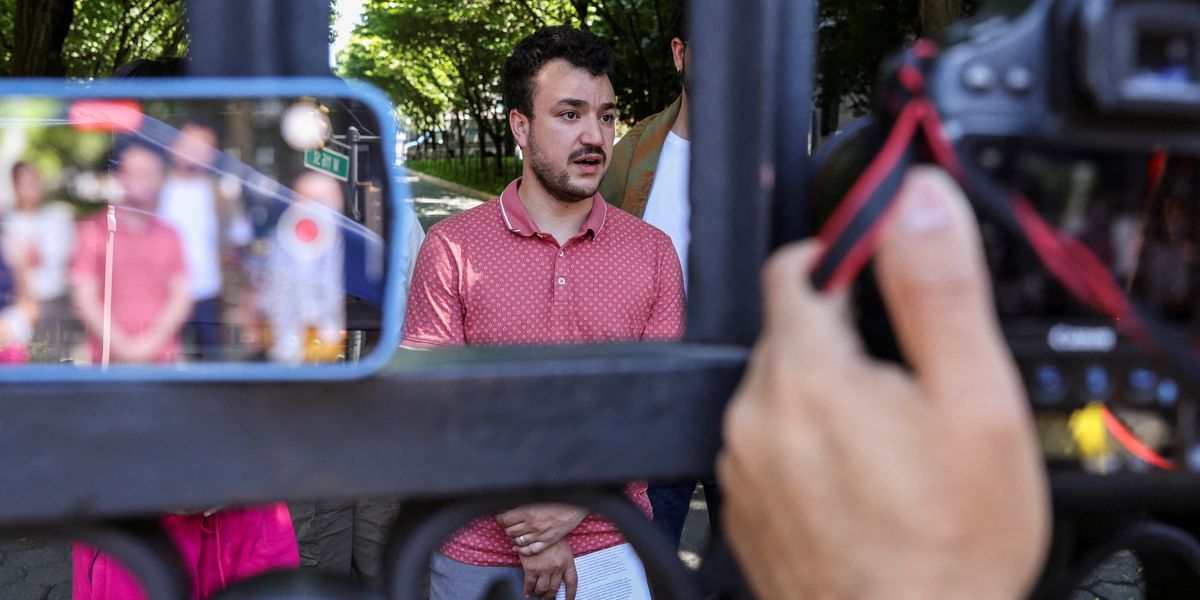Vice President JD Vance stunned Europe at the Munich Security Conference in February by calling the continent out for serious backsliding on core democratic principles.
He cited annulled elections when the wrong candidate appeared slated to win, digital censorship of opinions that run afoul of the majority or established perspective, and the policing of silent thought (prayer) as exhibits A, B, and C. “In Britain, and across Europe, free speech, I fear, is in retreat.”
After acknowledging similar trends in President Biden’s America, Vance boasted that, “In Washington, there is a new sheriff in town. And under Donald Trump’s leadership, we may disagree with your views, but we will fight to defend your right to offer it in the public square, agree or disagree.”
Unless you are a green card holder talking about Israel.
At an Oval Office memo signing/media spray the day of Vance’s Munich speech, the New Sheriff said he completely agreed with Vance’s assessment about the importance of free speech. Less than a month later, though, President Trump dispatched Department of Homeland Security immigration agents to arrest and abduct Mahmoud Khalil, a permanent and lawful resident of the United States, married to an American citizen, when he and his wife returned home from dinner.
His “crime”: participating in the non-violent demonstrations at Columbia University that inspired students across the country to stand up and demand that the U.S. government stop aiding and abetting mass killing in Gaza, including of tens of thousands of women and children.
While anti-war demonstrations have almost always been viewed as — and are — squarely protected by the First Amendment’s free speech and right of assembly guarantees, Trump is painting demonstrations against the Gaza war as “pro-terrorist, anti-semitic, anti-American activity.”
The pro-Israel Free Press quoted an unnamed White House official as acknowledging that “the allegation here is not that he was breaking the law,” but that Khalil “is a threat to the foreign policy and national security interests of the United States.”
This was echoed in remarks by White House spokeswoman Karoline Leavitt, who said Tuesday in an answer to a question about the administration's basis for deporting Khalil that, "under the Immigration and Nationality Act, the Secretary of State has the right to revoke a green card or a visa for individuals who … are adversarial to the foreign policy and the national security interests of the United States of America.” She added then that Khalil “sided with terrorists” by organizing protests that disrupted classes and harassed Jewish-American students and made them “feel unsafe.” She also accused protesters of handing out fliers “with the logo of Hamas.”
Jewish groups were among those protesting in New York City against Khalil’s pending deportation on Tuesday. Reports dating back to last year indicate that Khalil was not an organizer, but had served as a negotiator on behalf of students who had erected an encampment on campus.
Quite the opposite of strengthening free speech and our democracy, Trump appears to be leading us into a new McCarthyism. The president blasted out on his Truth Social account that, “this is the first of more [arrests and deportations] to come…We know there are more students at Columbia and other Universities across the Country…We will find, apprehend, and deport these terrorist sympathizers from our country — never to return again.”
Leavitt also ominously foreshadowed a looming clash on Columbia’s campus, saying that university officials are refusing to help DHS identify a list of other individuals on campus the administration has identified — reportedly through a search of students’ social media accounts. “[A]s the president said very strongly in his statement yesterday, he is not going to tolerate that.”
Meanwhile, Khalil was whisked far away from his wife in New York, who is eight months pregnant, to the LaSalle Detention Facility in Jena, Louisiana, a private prison, according to reports. He would likely have been deported already if not for a fast-acting federal judge in New York who blocked his removal from the United States until after a hearing, expressly forbidding deportation without approval by the court. The initial hearing is slated for Wednesday. Critics worry the administration “shopped” for a judge more sympathetic to its case.
We still do not know what he has been charged with, if anything, or any of the evidence against him.
The prohibition of free speech by student visa holders and permanent citizen green card holders in the United States is a clear and fundamental assault on our democracy — an effort to squelch and chill freedom of speech. It sends the same signal to the rest of the world that Vance and Trump accused Europe of sending: weakness and fear. If peaceful protest by students against a policy poses such a threat to our “national security,” how strong can we really be?
Back at the Munich Security Conference, Vance said: “the good news is that I happen to think your democracies are substantially less brittle than many people apparently fear, and I really do believe that allowing our citizens to speak their mind will make them stronger still.” The Vice President was right. And now is the time for vehement and loud assertion that free speech is not in retreat in America.














